Vestibular rehabilitation helps alleviate vertigo and dizziness. These illnesses are related to severe balance disorders, an inner ear condition where you might experience sudden symptoms like dizziness, nausea, severe vertigo, vomiting, and loss of balance. Don’t worry; we have your back with our advanced vestibular therapy, an exercise-based strategy to improve the symptoms of this disorder. This article will share some information about what it is, treatment options, and how life can get better with rehabilitation!
What Is Vestibular Rehabilitation?
BPPV, or Benign Paroxysmal Positional Vertigo, is a prevalent and widespread disease, with nearly one in four adults experiencing it. Only 25% receive appropriate and timely treatment of this population segment. The others avoid leaving their house or take frequent sick leaves, causing loss of employment and income.
It is identified as a disorder in the inner ear resulting in dizziness when specific head movements are made. The leading causes of this ailment are medication, alcohol, brain concussions, brain strokes, or cerebellar degeneration.
Considering how risky this order can be, it can cause an increased risk of disabling injury if it is not properly treated.
Vestibular rehabilitation is primarily exercise-based, where the nervous system is trained to make up for the issues concerning the inner ear. After analyzing the triggers for dizziness and the intensity, a therapist customized the exercise program for each patient. It has proved to be an effective solution that can reduce or eliminate the symptoms like dizziness, nausea, and other balance-related problems.
Specially trained vestibular physiotherapists carefully develop the exercises; it takes at least one or two sessions to show results and lessen symptoms. Some vestibular disorders that can be treated by physiotherapy include:
- Labyrinthitis
- Vestibular neuritis
- Migraine associated disorders
- Benign paroxysmal positional vertigo
- Dizziness and loss of balance
- Meniere’s
What Is A Vestibular Therapy Assessment?
Since vestibular disorders have various causes, it is crucial to trace their roots. You will be required to undergo an initial non-invasive test that helps identify the cause of your problem. The test would include the following:
- Balance test
- Eye test
- Positional test
- Gait analysis
However, if the results are unclear and your symptoms are complex, you may undergo further medical assessments. Some of the specialists will carry on the following tests:
- Hearing test
- MRI scans
- Caloric test
- Rotating chair test
- Videonystagmography (VNG)
How Does Vestibular Therapy Work?
After thorough testing, when your physiotherapist has determined the root cause of your vestibular disorders, they will assist you with treatment options for your specific condition. Usually, the treatment involves a set of manual exercises and activity modifications for restoring your vestibular system. You can practice these remedies at your home to limit symptoms. The treatment options are:
1 – Strength Building Exercises
People with vestibular disorders suffer from balance problems. To counter this, having strong muscles is crucial. Strengthening exercises help increase the capability of your body to counter the imbalance.
2 – Epley Maneuver
This treatment is for patients who are diagnosed with BPPV. It is a series of exercises that includes body and head movements to eliminate dizziness. The treatment is effective, and results can be seen after a session.
3 – Gait Drills
Gait drills include some fun exercises typically walking-based, including walking over obstacles, walking and turning simultaneously, etc. These exercises train the vestibular system to encounter complex situations without showing dizziness, nausea, and others.
4 – Balance Training
Balance training consists of activities that help in improving and restoring balance. The exercises include:
- Standing on a single leg.
- Walking with your eyes closed.
- Walking on uneven surfaces.
5 – Symptoms Management
Your physiotherapist will guide you on the dos and don’ts of your condition and how you can overcome or encounter symptoms quickly.
What Are The Benefits Of Vestibular Therapy?
The benefits of vestibular physiotherapy are life-changing. You will better understand your condition and develop coping and management strategies. Some people have admitted immediate relief after a session. Here are other benefits:
- Reduced dizziness
- Improved body balance
- Restored energy levels
- Fatigue management
- Better vision
- Boost confidence
Book Your Vestibular Physiotherapist Today!
If you face similar symptoms or have been previously diagnosed with a vestibular disorder, contact us directly to benefit from our expert physiotherapists in Bowmanville, Oshawa, Peterborough, Cobourg & Port Hope. We will assess you and design a personalized treatment series for your condition.







